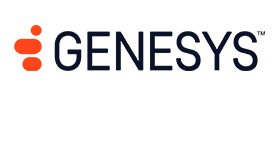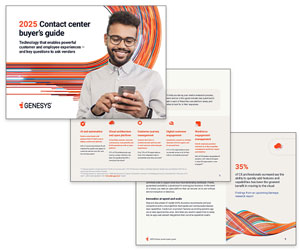Ryan Black at Genesys takes a look at differentiating your experience-as-a-service as a managed service provider (MSP).
As one of the co-vertical leads for the MSP and VAR sector at Genesys, my primary objective is to provide unwavering support to VARs and MSPs in the UK&I market.
My focus is on harnessing the potential of our cutting-edge technology to assist them in achieving their strategic goals.
Drawing on my extensive experience in the industry, where I have worked with some of the largest MSPs in the UK, I have prepared an article that examines the current trends in the industry.
The article primarily focuses on the shift from a transaction-based model to a relational one, which VARs are undergoing by transforming into MSPs.
I explicate the reasoning behind this change, elucidate the benefits, and explore the challenges that VARs may face in this transition.
Additionally, I highlight the ways in which Genesys, including our Genesys Cloud offering, can support VARs in overcoming these challenges and achieving their strategic objectives.
The UK SMB market for critical telecom and IT services is valued at 7BN and is subject to constant evolution, largely due to the advent of cloud computing and unified communications.
These technologies serve as the backbone of modern workplaces, enabling efficiency, security, and cost-effectiveness. However, adopting these technologies necessitates a fundamental shift in the business model of value-added resellers.
This shift entails a commitment to delivering continuous value and support as a managed service, building long-term customer relationships founded on trust, expertise, and a deep understanding of their challenges and objectives.
This shift is crucial and represents a strategic move that can enhance customer loyalty, augment customer lifetime value, and ultimately foster business growth.
How to Become Unique
MSPs and VARs often face challenges when trying to stand out in a highly competitive market. To attract new customers, they tend to offer the same value-added services, such as excellent support and quickly resolving technical issues.
Since many suppliers claim to provide top-tier service, how can they prove their claims and differentiate themselves from their competitors? The key is to show the evidence and let the quality of their service speak for itself.
The Challenge
Numerous VARs have expanded their operations by means of organic growth and strategic acquisitions.
However, each acquisition presents VARs with a unique integration task, which requires seamless integration of new products and services into the existing portfolio and in-house applications to manage customer data and interactions.
The integration tasks VARs encounter are particularly challenging, requiring coordination across multiple departments, including sales, service, marketing, and IT.
Successful integration demands an in-depth understanding of the acquired company’s products, services, and customer base, as well as the ability to adapt to new systems and processes quickly.
Due to these hurdles, many VARs employ a disparate mix of technologies, with siloed technical support teams working independently across the group.
The acquisition of new customer bases also presents a challenge of diversity within the customer base. The clientele may vary significantly in terms of spending capacity, ranging from clients spending as little as £100 to those spending up to £10,000 per month.
This diversity in spending capacity leads to disparate expectations in terms of the level of service required, given the complexity of products and services consumed.
As such, MSPs face the challenge of delivering consistent levels of service across their customer base. It is pertinent to ask how MSPs can meet the varying expectations of their clients whilst maintaining the quality of their services.
The Impact
Organisations that employ disparate technologies across their estate frequently encounter challenges when managing customer interactions.
This is primarily due to the unique approach taken by each interaction, which is typically accompanied by varying levels of empathy, support, and SLAs. This inconsistency presents a significant issue for VARs which aim to distinguish themselves in a highly competitive market by providing exceptional service.
To put it simply, when a company treats all its clients the same and fails to distinguish the high-value ones who require more attention and effort from the transactional “lower-end” of the market, it leads to a resource-intensive operational framework.
This means that agents are always busy handling customer interactions of any type, regardless of the client’s worth. This approach inevitably affects the level of service provided by the company and increases the risk of losing valuable clients, especially those who have a higher spending capacity.
In today’s business landscape, customers expect quick and efficient personalised service. However, organisations that deal with a range of uncoordinated technologies with inconsistent quality standards find it challenging to meet these expectations.
Additionally, VARs considering a transition to an MSP may face difficulties choosing the right technology and partner to assist them in this journey, particularly when they are unsure how to deliver services proactively and to the highest standard, aligned with their strategic goals.
The Utopia
Many MSPs’ primary objective is to establish a utopian scenario where their proclaimed claims of being easy to do business with and interact with and the clear preference for any customer seeking a supplier that can deliver critical technological services to their business are tangibly realised.
This is only achievable through the consistent delivery of exceptional service, quality, and empathetic experiences for all customers, irrespective of the nature of the interaction.
The Opportunity
Creating Brand Loyalty
Today’s customers expect MSPs to not only solve their problems but also make them feel valued. Companies that exceed customer expectations gain loyalty.
Support teams are the first point of contact for customers facing issues, and delivering high-quality support services is essential for a company’s success.
Recent studies show that customer satisfaction is the most important index for measuring support success, but companies that prioritise exceptional service create brand amplifiers that will promote their brand to others.
To turn satisfied customers into loyal advocates, MSPs can leverage AI to provide instant support and self-serve tools, create seamless experiences across channels, and ensure empathetic human support.
By delivering a customer experience that reflects the company’s values, support agents can secure a special place in their customers’ hearts.
Increasing Product Penetration
Many MSPs aim to increase their customer lifetime value by offering a wide range of services and cross-selling as many of them as possible.
For this to happen, they need to ensure that their customers are delighted with the first service or product they purchase. But what if MSPs could capture additional sales at the Point of Sale, instead of later in the customer journey?
Genesys Copilot is an AI-powered tool that supports agents in real time by providing them with specific information and insights during customer interactions.
Copilot has several use cases, but in this context, it could assist sales agents by presenting them with relevant knowledge, commercial promotions, or prompts to help increase product penetration and achieve the desired business outcomes for the MSP.
Right First Time Resolution
MSPs typically offer a wide portfolio of technology products and services to their customers, positioning themselves as a one-stop shop for all their technology needs.
However, providing support for such a diverse range of services requires an investment in training for support agents.
This training is essential to ensure that agents can actively handle customer interactions, regardless of the type of inquiry, be it a connectivity issue or a question about mobile services.
Equipping support agents to handle such diverse interactions is challenging, and often, independent resolver groups are created to facilitate the resolution of customer tickets.
Another compelling use case for Genesys Copilot is its ability to surface relevant product or service knowledge to support agents.
This enables them to effectively assist customers without having to transfer them to another department or specific resolver group. This feature enhances the overall customer experience and has a positive impact on the organisation’s bottom line.
Pro-Active as Opposed to Reactive
MSPs utilise tools such as Voice of the Customer (VoC) and third-party review sites like TrustPilot to gain valuable feedback on the services they offer. However, these techniques are reactive in nature as they provide insights only into past customer interactions.
Given the high volume of customer interactions that MSPs manage, it is crucial to maintain a consistent level of quality and address customer issues proactively to prevent any negative effect on their brand reputation and customer loyalty.
Genesys, a prominent provider of contact centre and customer experience solutions, offers speech and text analytics capabilities that enable MSPs to analyse customer sentiment and empathy in real-time.
This technology provides deeper insights into customer feedback and adds more business value by instantly notifying key operational stakeholders when an interaction is deemed unfavourable.
Clients who choose to automate quality management with generative AI and speech and text analytics have witnessed an average daily savings of 15% by implementing recording and quality management tools.
Additionally, this has led to a 5% reduction in contacts through efficiency gains in quality assessment.
Managing Unexpected Events
Technology is not perfect, and sometimes things can go wrong. For instance, major service outages (MSO) can occur, leading to a large number of customers reporting a downtime issue.
This situation poses several challenges for MSPs, including restoring the disrupted service, managing customer expectations, and maintaining service level adherence, given the sudden increase in interactions coming into their contact centre.
Genesys Cloud provides MSPs with a way to minimise interactions to the contact centre by offering customer updates about MSOs through the IVR, which can be pre-configured and implemented ad-hoc at the push of a button.
Moreover, it can also send SMS updates regarding the MSO to customers that have called into the IVR and been deflected, eliminating the need for them to call back and helping them understand when they can expect their service to be restored.
Additionally, Genesys Cloud allows MSPs to issue agent-less campaigns to customers via multiple channels as soon as they are notified of an MSO, helping MSPs provide proactive services rather than reactive ones.
Enabling Self-Service
As mentioned in the challenges section, MSPs encounter a multitude of customers with varying expectations of customer experience. The customers, both large and small, expect the highest standards of customer service.
Interaction with the customers for simple products that do not have multiple facets typically constitutes a straightforward process that agents can resolve in a timely manner.
However, this process across all customer interactions is labour-intensive and time-consuming, and consequently, it may not be the most efficient mechanism for addressing simple queries from the customer base.
Genesys has a history of supporting MSPs in enabling self-service and streamlining their operations. This is facilitated by the company’s portfolio, which incorporates an open API platform capable of querying third-party databases to obtain vital information for customers, including updates on orders and cases.
Moreover, MSPs that invest in online support hubs that promote self-service can leverage Journey Management and Predictive Engagement to engage customers proactively and offer chatbot-assisted support when they browse particular support articles.
This proactive mechanism mitigates the risk of customer journey abandonment and facilitates self-service containment.
Empowering Your People
During a recent discussion on sales strategy with a leading MSP, I was introduced to the acronym “AIR,” which stands for Acquire, Increase, and Retain. I was informed that the “Retain” aspect of this strategy should not be limited to customers but should also extend to staff and key personnel.
It was suggested that providing excellent employee experiences has a significant impact on the quality of the customer experience, ultimately contributing to their market-leading CSAT scores.
Genesys offers a Workforce Engagement Management (WEM) suite to help MSPs invest in their workforce.
This suite provides MSPs with critical performance metrics and enables the introduction of gamification, which fosters healthy competition within the contact centre and drives service improvements.
MSPs can also access employee leaderboards and forecasting and scheduling tools for supervisors to create agent schedules that meet customer demand while ensuring a positive agent experience.
Maximising Enterprise Value
MSPs strategically seek to achieve year-over-year growth, thereby positively impacting their EBITDA performance.
To this end, Genesys offers support to MSPs seeking to reduce operational costs through technology consolidation and the adoption of our single experience orchestration tool.
Moreover, our expertise extends to assisting clients in crafting business cases with tangible returns on investment projections through reducing average handling time (AHT), promoting self-service, and monetising enhanced customer experiences.
The Solution
Genesys is dedicated to supporting VARs in their transition to becoming MSPs. We aim to empower MSPs to take advantage of their opportunities.
We believe every interaction managed by an MSP should be tailored to meet the customer’s specific needs, carried out with empathy, and delivered to the highest standards.
We are convinced that MSPs have the potential to offer unparalleled value to their clients, not only by upgrading their technological infrastructure but also by transforming their entire operational ethos.
To achieve this, we provide our clients with a comprehensive suite of AI-powered contact centre technologies to revolutionise and optimise customer engagement.
This blog post has been re-published by kind permission of Genesys – View the Original Article
For more information about Genesys - visit the Genesys Website
Call Centre Helper is not responsible for the content of these guest blog posts. The opinions expressed in this article are those of the author, and do not necessarily reflect those of Call Centre Helper.
Author: Genesys
Published On: 29th May 2024 - Last modified: 23rd Oct 2024
Read more about - Guest Blogs, Genesys






 Genesys empowers more than 8,000 organisations in over 100 countries to improve loyalty and business outcomes by creating the best experiences for their customers and employees. Through Genesys Cloud, the AI-Powered Experience Orchestration platform, Genesys delivers the future of CX to organisations of all sizes so they can provide empathetic, personalised experience at scale. As the trusted platform that is born in the cloud, Genesys Cloud helps organisations accelerate growth by enabling them to differentiate with the right customer experience at the right time, while driving stronger workforce engagement, efficiency and operational improvements.
Genesys empowers more than 8,000 organisations in over 100 countries to improve loyalty and business outcomes by creating the best experiences for their customers and employees. Through Genesys Cloud, the AI-Powered Experience Orchestration platform, Genesys delivers the future of CX to organisations of all sizes so they can provide empathetic, personalised experience at scale. As the trusted platform that is born in the cloud, Genesys Cloud helps organisations accelerate growth by enabling them to differentiate with the right customer experience at the right time, while driving stronger workforce engagement, efficiency and operational improvements. 






























